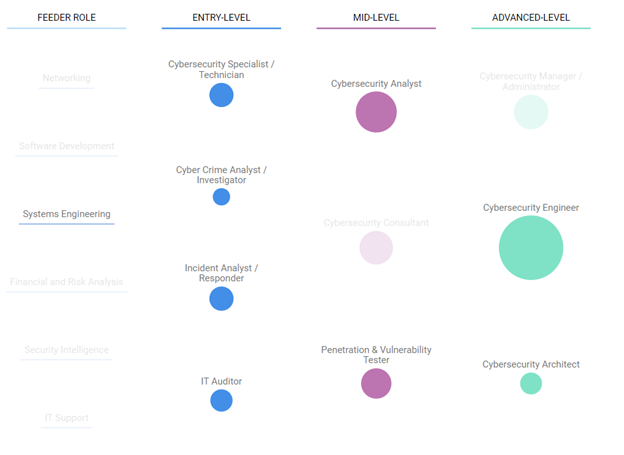
As a systems engineer, you are skilled in implementing new systems, fixing errors in existing systems and improving performance through hardware upgrades. These skills are so interchangeable that they can help lead you toward a career in cybersecurity.
If you are looking to transition from a career as a systems engineer to cybersecurity, look no further.
Systems Engineering to Cybersecurity: The Skills You Need
Your experience as a systems engineer gives you unique tech skills that can help you build toward a career in cybersecurity.
In the United States, there are currently over 307,215open jobs in the systems engineer feeder role that request the following cybersecurity skills from potential systems engineer candidates:
|
GENERAL TECH SKILLS REQUESTED |
CYBERSECURITY SKILLS TO ADD |
| Computer Science |
Systems Analysis |
| Systems Engineering |
Linux |
| Agile Methodology |
Business Requirements |
| Automation |
Operating Systems |
| Project Management |
Software Development |
If you have any of the above skills, highlighting them on your resume and during interviews can help position you as an excellent candidate for the large number of jobs currently hiring, according to CyberSeek.
How To Learn These Skills
CompTIA certifications cover the skills you need to move from systems engineer to cybersecurity, and each certification has a full suite of training products so you can tailor your studying to how you learn best.
If you’re not sure which certification is right for you, take a look at the CompTIA Cybersecurity Career Pathway. For those brand new to IT, CompTIA A+ will give you a solid foundation for understanding things like operating systems, hardware and troubleshooting. CompTIA Network+ helps you understand the ins and outs of computer networks, how they’re set up and how they function so you know what you’re working to secure. And CompTIA Security+ validates the baseline skills needed to perform core security functions. Once you have some experience under your belt, CompTIA Linux+ is the perfect complement to your cybersecurity skills.
Once you choose which certification is right for you, download the exam objectives to see what’s covered and then select your training solution. You can take a class, like CompTIA Live Online Training, or self-study with CertMaster eLearning solutions.
CertMaster Learn
CertMaster Learn is a self-paced, comprehensive online learning experience that helps you gain the knowledge and practical skills necessary to be successful on your CompTIA certification exam, and in your IT career. CertMaster Learn helps you stay on track with your studies, while robust analytics bring awareness of strengths and weaknesses.
CompTIA Labs
CompTIA Labs make it easy for you to practice and apply your skills in real workplace scenarios in preparation for the certification exam. All lab activities use real equipment and software, are based on scenarios found in the workplace and align with CompTIA exam objectives.
The newly integrated CertMaster Learn + Labs is now available for CompTIA Security+. Learn more here.
Systems Engineering to Cybersecurity: The Education You Need
According to CyberSeek, the following educational requirements represent the percentage of online job listings that don’t require a degree or require a bachelor’s and graduate degree:
- 9% do not require a bachelor’s degree
- 66% require a bachelor’s degree
- 25% require a graduate degree
As you can see, most of these systems engineer job roles require some type of formal education and IT pros should keep this criterion in mind when searching for a new job.
Learn About the Other CyberSeek Pathways and Feeder Roles
Networking
Software Development
Financial and Risk Analysis
IT Support
Security Intelligence
Systems Engineering to Cybersecurity: The Jobs You Can Get
The systems engineer job roles that mesh well into a cybersecurity role range across the board from entry-level to more mid-level and advanced-level job roles, as seen below.

Entry-level Jobs
Average salary for these job roles: $97,616.
- Cybersecurity specialist/technician
- Cyber crime analyst/investigator
- Incident analyst/responder
- IT auditor
Mid-level Jobs
Average salary for these job roles: $115,885.
Advanced-level Jobs
Average salary for these job roles: $139,455.
Systems Engineering to Cybersecurity: The Certifications You Need
CompTIA Certifications
CyberSeek has examined the open jobs in the systems engineer feeder role, and the following certifications are the most commonly requested by hiring employers.
- CompTIA Security+: Validates the baseline skills necessary to perform core security functions and pursue an IT security career.
- Certified Information Systems Security Professional
- IAT Level II Certification
- Microsoft Certified Systems Engineer
- Cisco Certified Network Associate
Transitioning to a career in cybersecurity from systems engineering is not a crazy move. The skills you’ve developed in systems engineering have prepared you for this change, and CyberSeek can help you stay up-to-date on the skills and certifications needed to succeed in a cybersecurity career.
Check out the CompTIA Cybersecurity Career Pathway to see how CompTIA certifications can help you get into cybersecurity and advance your cybersecurity career.

